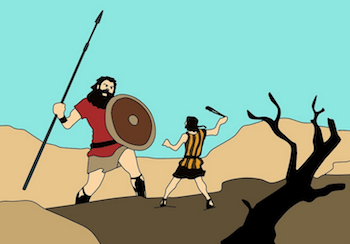A small business lesson from David and Goliath...
You know the story – small shepherd boy beats giant in what should have been a very one-sided battle. The giant has all the advantage – size, strength, resources. What could David possibly do to bring down Goliath? Turns out he was pretty good with a slingshot. One well-delivered stone to his opponent’s weak spot brings the giant to his knees making him an easy target for David’s sword. It’s the classic story of the underdog who comes out on top and there are lessons in it for everyone – especially small businesses.bsp;
Apple started life as a little operation run out of a garage that took on behemoths Microsoft and IBM, and won. Similarly, Netflix was the brainchild of two friends that went head to head with Blockbuster, and won. There are loads of examples of small business taking on the commercial giants and winning – but how did they do it?bsp;
If we think of small businesses as the Davids of the business world – here’s what we can learn:
Bigger isn’t always better
Big certainly takes up more space but, like David, small can be nimble. Small businesses are often more flexible and better placed to adapt quickly to market changes, unlike cumbersome big businesses that are slow to change due to bureaucracy, rigid processes and inflexible attitudes.
Find your enemy’s weak spot
David identified Goliath’s weak spot and attacked it relentlessly, so once you’ve found the chink in your enemy’s armour, go in for the kill. Large companies are usually well resourced and well prepared to defend against direct attacks but if you go under the radar and even use the element of surprise; you might just find another way to bring them down.
Believe in yourself and the job’s half done
Even though he was most definitely the underdog, David stepped up to face the giant – even when trained soldiers were too scared. Confidence not only breeds success, it can also cause your opponent to second guess, and any pause gives time for attack.
Think outside the square
The obvious way isn’t always the best way. There was no way David could match the giant in terms of strength or size, so he didn’t bother. He took an entirely different approach, using his own personal strengths against the giant. Approach your big business competitors the same way – don’t match them, come at them from a different, unexpected angle.
Accuracy matters
David didn’t bombard the giant with sticks and stones and anything else he could get his hands on. No, he delivered one perfectly aimed stone and brought Goliath to his knees so he could finish the job with his sword. Hone your attack to what you know you can do well. Narrow your target and spend your money and resources wisely. One deadly direct hit is better than a smattering of pellets.
Know your strengths
David wasn’t as strong, big or well armed as Goliath but he knew his way round a slingshot. In small business, you can’t be everything to everyone. Big commercial companies will always have more resources, more money and time so focus on what you do and do it well.
Going head to head with Goliath may seem like an impossible battle, but with a little ingenuity and a few lessons from David you can come out on top – and oh, does it feel good when you do!
Checkout more on growing your business for the day you sell.
Recommend this article:
- Avoiding business burnout
- Growth through business acquisition
- What business are you in?
- Learning from business failure
- Small business budget tips
- How to take on the corporate giant and win
- The power of testimonials
- Utilising small business downtime
- The 3 Rs that can boost your business
- Adapt your business to survive
- Keeping cash flow positive
- Future proofing for business survival
- Small business change management
- What keeps small business owners up at night
- 5 recruitment tips for small businesses
- Business execution and discipline
- The potential of brand ambassadors
- Bringing on customers at no cost
- Managing a seasonal business
- Competition is good for business
- 6 financial tips for small businesses
- Going it alone with your small business
- Do I need a Business Plan?

